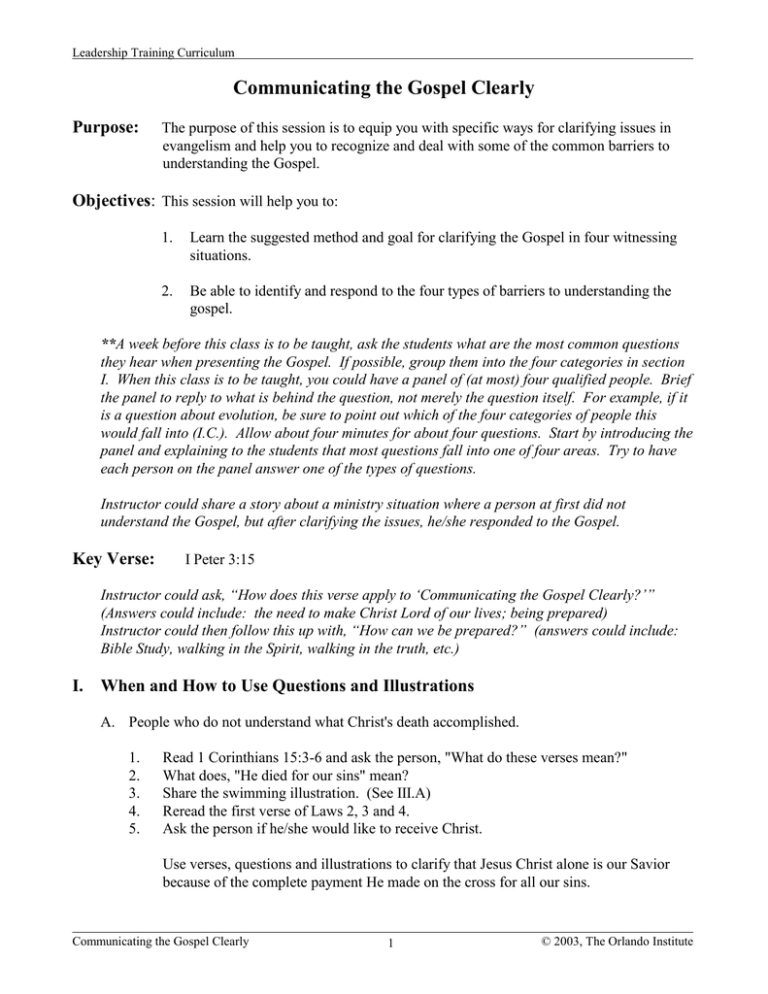Communicating the Gospel Clearly Purpose:
advertisement

Leadership Training Curriculum Communicating the Gospel Clearly Purpose: The purpose of this session is to equip you with specific ways for clarifying issues in evangelism and help you to recognize and deal with some of the common barriers to understanding the Gospel. Objectives: This session will help you to: 1. Learn the suggested method and goal for clarifying the Gospel in four witnessing situations. 2. Be able to identify and respond to the four types of barriers to understanding the gospel. **A week before this class is to be taught, ask the students what are the most common questions they hear when presenting the Gospel. If possible, group them into the four categories in section I. When this class is to be taught, you could have a panel of (at most) four qualified people. Brief the panel to reply to what is behind the question, not merely the question itself. For example, if it is a question about evolution, be sure to point out which of the four categories of people this would fall into (I.C.). Allow about four minutes for about four questions. Start by introducing the panel and explaining to the students that most questions fall into one of four areas. Try to have each person on the panel answer one of the types of questions. Instructor could share a story about a ministry situation where a person at first did not understand the Gospel, but after clarifying the issues, he/she responded to the Gospel. Key Verse: I Peter 3:15 Instructor could ask, “How does this verse apply to ‘Communicating the Gospel Clearly?’” (Answers could include: the need to make Christ Lord of our lives; being prepared) Instructor could then follow this up with, “How can we be prepared?” (answers could include: Bible Study, walking in the Spirit, walking in the truth, etc.) I. When and How to Use Questions and Illustrations A. People who do not understand what Christ's death accomplished. 1. 2. 3. 4. 5. Read 1 Corinthians 15:3-6 and ask the person, "What do these verses mean?" What does, "He died for our sins" mean? Share the swimming illustration. (See III.A) Reread the first verse of Laws 2, 3 and 4. Ask the person if he/she would like to receive Christ. Use verses, questions and illustrations to clarify that Jesus Christ alone is our Savior because of the complete payment He made on the cross for all our sins. Communicating the Gospel Clearly 1 © 2003, The Orlando Institute Leadership Training Curriculum B. People who think salvation is a reward for good works. 1. 2. 3. 4. 5. Ask: "If you died tonight, are you sure you would go to heaven?" Ask: "Suppose you died tonight and stood before God and He asked you, 'Why should I let you into heaven?' How would you answer?" Read Ephesians 2:8,9 and ask, "What do you think the word 'grace' means?" Grace = God's riches at Christ's expense or unmerited favor which gives us what we do not deserve. Emphasize the fact that we can have salvation and a personal relationship with God only at Christ's expense. It is His death on the cross that pays the price for our sins. Read Revelation 3:20. Ask: a) "What does the door represent?" b) "What is our responsibility?" c) "What is Christ's responsibility?" Ask: "Based on what we have seen, would you like to invite Christ into your life?" Use verses and questions to clarify to people that their only responsibility is to trust Christ as their Savior. They cannot pay for their sins. Christ did that on the cross. C. People who have intellectual questions * * * * * Don’t argue what you do not know. Answer as honestly as you can. Challenge the presuppositions behind the questions. Point them to the Word and to Jesus. Share your testimony. Tell them you will get back to them with some literature. D. People who are religiously eclectic or from other religions Ask direct questions concerning: 1. The nature of man, i.e. Why is man good and bad, noble and ignoble. 2. How he got that way. (Listen to their answers carefully. They will give you hints to their beliefs and stepping stones to new questions.) 3. The solution to fixing the problem of man. 4. Assurances that the solution will work. 5. Talk about Christ and how he is the perfect solution for man’s sinfulness. These are four basic witnessing situations that we often deal with. Frequently these questions arise from deeper issues that exist in the person. Now let’s talk about four of the barriers we encounter most often when we share the Gospel. II. Four Barriers to Understanding the Gospel We are defining a "barrier" as anything that distorts the Gospel or hinders the unbeliever's ability to understand the Gospel and come to saving faith in Jesus Christ. Communicating the Gospel Clearly 2 © 2003, The Orlando Institute Leadership Training Curriculum As we identify a barrier that seems to be hindering the non-believer's comprehension of the gospel, we need to respond appropriately to that barrier, keeping in mind that the goal of our interaction is not to win an argument for ourselves, but to win a person to Jesus Christ. (2 Timothy 2:24). Instructor could divide students into groups of 3 or 4. Half of the groups look at John 4:4-30; the other half look at Acts 17:22-31. Let them discuss the barriers encountered and how they were dealt with. Give about 7 – 10 minutes, then ask for some to share answers. Read John 4:4-30 and list the barriers Jesus addressed as he communicated with the Samaritan woman. Indicate how He dealt with each barrier. Read Acts 17:22-31 and list the barriers Paul addressed as he communicated with the Athenians. Indicate how he dealt with each barrier. Note to instructor: Briefly summarize the 4 barriers below and note the solution to each. Take no more than 5 minutes. Instructor may want to share an example of a time he/she encountered one of these barriers, and his/her response. A. Cultural Barriers. Barriers that are transmitted by culture itself; i.e., the normative beliefs, attitudes and behaviors of entire nations and/or groups. Solution: Start from their culture. Then focus on universal needs of people and how Christianity alone meets them. Share the changes Jesus can make in our character and relationships as a result of personally deciding to follow Him. B. Theological Barriers. Many believe that what one believes does not really matter as long as he or she is sincere in that belief. Solution: Focus on the person and work of Christ. Gal. 2:21; Col. 2:13-15; Romans 10:1-4. C. Personal Barriers. The non-believer's personal experiences and attitudes may hinder them from appreciating the ramifications and benefits of the gospel. Solution: Prayerfully seek insight into what is blocking their receptivity to the Gospel. Proverb 15:1, 23. Listen in order to understand their background and experiences. Choose a solution that answers their personal issues with the Gospel. D. Spiritual Barriers. 2 Timothy 2:24-26; 2 Corinthians 4:4; John 6:44, 65; John 16:8-11. Communicating the Gospel Clearly 3 © 2003, The Orlando Institute Leadership Training Curriculum Solution: 1. 2. Prayerfully seek insight. Correct their error through gentleness by teaching the Word. III. Making the Issue Clear A. Swimming Illustration #1: Let me illustrate why Jesus is called our Savior in the Bible: (Name), suppose you could not swim and were dropped into deep water. You began to drown and called out for help. I came along in a boat, heard you and said, "Here is a book called, Ten Easy Lessons on Swimming. Read it and you will be okay." Would I be your savior? #2: No, but you would make me angry. #1: Right! Let us apply this to our understanding of the word "savior." This is the way some people look at Christ. They think He came to give us the Bible and say, "Read it, and if you can figure it out and live according to the rules, someday you will be all right." If that is all that Christ came to do, then He is not our Savior, is He? #2: No, He is not. #1: How would you answer this? Suppose that I rowed my boat out to you, jumped into the water and said, "Here, watch me swim. Notice how I stroke the water and kick vigorously at the same time." And then I got into the boat and sped away. Would I be your savior? #2: Of course not. #1: Why? #2: Because you would not be helping me. You would be showing me how you can swim, but that would not do me any good. #1: (Name), that is right. Let us apply this to our understanding of the word "savior." Many people think that Christ came to be a good example of how to live the Christian life. But the fact that He lived a perfect life does not help us any more than a person giving a swimming demonstration helps someone drowning. #2: Correct. #1: Suppose I pulled you out from the water and into my boat and then, a kilometer from shore, I thought, "He has not offered me anything in return for what I did for him. I think I will throw him back into the water." So I throw you back. Would I be your savior? #2: Not at all. #1: No, I would not. I offer temporary help, but not salvation. Apply this to our understanding of the word "savior." Some people think that Christ does this. They think He says, "I died on the cross for you, but unless you follow 25 rules, you cannot experience salvation. If that were true, then He is not really our Savior. #2: I understand. #1: In any of these situations, I would not be your savior. What would I have to do to be your savior? #2: Rescue me out of the water and, take me to dry land. #1: That is right. I would only be your savior if I took you out of the water and brought you to shore. Communicating the Gospel Clearly 4 © 2003, The Orlando Institute Leadership Training Curriculum (Name), that is what Christ has done. He became our Savior when he delivered us completely from the predicament of sin by dying on the cross. He took the punishment we deserved for actively and passively rebelling against God, who is holy. He did that 2000 years ago; and now, when we choose to accept His "rescue operation," He puts us in His boat and takes us to dry land, where we can have fellowship with God. B. Further Verses and Questions for Someone Who Does Not Understand Their Need for a Savior. 1. Read James 2:10. 2. Ask: "According to this verse, can someone sin once and expect to be saved?" Answer: "No." 3. Turn to Romans 6:23 on page 5 of the Four Spiritual Laws, and point out the results of that sin. 4. Turn to Law Three and read Romans 5:8. 5. Turn to Law Four and read John 1:12. 6. Point out how God has made a provision for the penalty of sin through the Savior, Jesus Christ. 7. Ask: "Based on what we have read, would you like to invite Christ into your life?" C. What to do if a person claims to be an agnostic or an atheist. 1. Ask: "Do you think that God could exist outside of your knowledge? Then you do not know for sure if there is or there is not a God, do you?" 2. Most people are agnostic rather than atheistic. The question that follows is, "Do you care? Do you want to know if there is a God or not? If you want to know, then I want to share with you some things that have been helpful to me." If there is interest, you may talk a while. It is important that, when you leave a person, he at least enjoyed talking to you. Do not make him feel that, because he did not respond, you think badly of him. You should leave with the feeling that he has learned about Jesus. Be nice to people; talk about other things and be free and open. Maybe another time, the fruit will be ripe. If there is more interest, then ask him to read the Gospel of John three times. Turn to the first and last chapters and show the length - about 20 pages. Show him why John wrote the book (John 20:30-31). "The reason John wrote it was so that you could believe what Christ claimed to be. If He is who He claimed to be, then we can trust what He has to say." D. Additional questions to ask to help make the issue clear. 1. "Have you ever seen what Jesus said the requirements were to enter the Kingdom of God?" Read John 3:1-8 and explain Nicodemus. Here was a man who went to "church" three times a day, prayed seven times a day, gave money to the poor, memorized the Old Testament and lived a highly moral life. Christ told him he would never see heaven unless he was born again. Show him that without this new birth he will not enter the Kingdom of God because that which is born of the flesh is physical and that which is born of the Spirit is spiritual. Communicating the Gospel Clearly 5 © 2003, The Orlando Institute Leadership Training Curriculum 2. "Why do you think God gave the Ten Commandments?" (Cf. Romans 3:19-20.) This is the standard by which to measure yourself. They were not given in order for people to keep them and thus get to heaven. They show what God's standard of perfection is, and that none of us can possibly attain that standard. The Ten Commandments are not the "medicine" that saves us, it's rather the thermometer that tells us we have a problem needing a cure - a Savior. Instructor may want to ask if this session has helped and if it has given ideas on how to respond to people in the student’s target area. Instructor could ask if any students have encountered people in their target area with any of these barriers. Discussion Questions: 1. What is the suggested method and goal for clarifying the Gospel in the four witnessing situations discussed? 2. What are the four types of barriers to understanding the gospel? How do you respond to them? Communicating the Gospel Clearly 6 © 2003, The Orlando Institute







